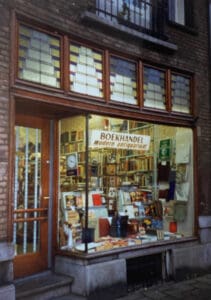
Last year I spent a summer with a friend in a small coastal town in the United States of America. The house we were staying in had a lovely little library of its own, while outside, everywhere we went we found little free library boxes, and every Monday morning the local library in town had a book sale with a very nice selection of books for very sweet prices. The town even had a sprawling, excellently stocked, second-hand bookstore. Go small-town America!
Having spent most of my life in Amsterdam and New York City, from which almost all second-hand bookstores have disappeared, where the free book boxes are usually empty and libraries have become places that are, for various reasons, loud and/or stinky, this was book heaven. It felt almost as good to me as my grandmother’s second-hand bookstore in Noord-Holland had, where, as a child, I spent lots of quiet time reading in corners on the cool and smooth granite floor, with my grandmother’s dog Borretje curled up next to me. I loved books.
After my father died, I stopped reading. And even when I eventually started again, reading never felt like the home it used to. Not even when I found my Big Love book, the book of my heart, Jacob Israel de Haan’s Pijpelijntjes, did reading feel like home the way it once did.
Last summer my friend said, “I always think I would love to just read, that when I have time I’ll read, but then I never do. I’ve decided I’m going to do it now.” And she did. She started with Njáls Saga. Some of it she found very interesting and some of it she found boring, but she was determined to finish it. Every day at the beach she would read a few pages and sometimes on a rainy day she would read inside the little house, and then she’d tell me about it. It sounded fun and intruiging, and at that slow pace, she finally finished it. I felt like it took her forever considering how thin that book was, but she was so happy to have finished it, and she read several more books that summer.
I loved hearing her talk about the books. It was clear that they made her have thoughts she hadn’t had before reading them and gave her new insights—about humans, about history, about so many things—thoughts, by and large, that I hadn’t had either. It was delightful. And as the list of books she’d read got longer, I became fascinated by how she was reading these books: every day, a few pages at a time. Reading that way had never occurred to me. Weren’t you supposed to read everything in big chunks, as big as you could manage in a few consecutive days, preferably one or two, a week at most? How else were you going to keep everything fresh in your mind and really have the full, submersing experience? That was how I always read. Once I started on a book, I would finish it as quickly as I could, or abandon it.
For several weeks last summer, I had a book sitting on my nightstand that I’d found in one of the free book boxes, a Penguin Classic by Shirley Jackson called The Haunting of Hill House.
One day I thought, Okay, I’ll try my friend’s technique. I started reading a few pages at a time, ten or so, sometimes a little more or a little less, depending on what felt like a good place to stop. Having never heard of Shirley Jackson, I was entirely unprepared for her writing, and as I was reading, I kept thinking, What is she doing? The back of the book implied that it was a horror story, and there was definitely something scary happening in Hill House, but it felt as if the real drama was with the characters. I couldn’t put my finger on what it was exactly and I still can’t, but in order to help myself and not bother my friend with endless questions that she couldn’t possibly know the answer to since she hadn’t read the book, I started taking notes. Nothing smart or difficult, just what happened in what I’d read, and adding any thoughts I might have on it.
It felt laborious at first and also a bit silly to write all that down. I wasn’t in school, I didn’t have a book report to write or an exam to take. What was the point of taking these notes? But, as I was writing down what happened in the book, thoughts would come to me that I hadn’t had while reading, and when I wrote those thoughts themselves down, they would lead to more thoughts, and I started having insights into what I was reading in ways I had never had before. It made me enjoy the book more. When I finished The Haunting of Hill House I was so happy that I read another book in exactly the same way, notes and all, and another after that and another after that.
I don’t read all of my books this way. If I read a pulpy, modern, mass-market book, something escapist and fun, I don’t take notes and I sometimes read those in a day or two, and at most write a few sentences about what I thought of it after. I’m reading a lot more now, I might even make it to 20 books this year, which is double what I would read in recent years, and still much, much less than I read before my father died. But what makes me happiest is that reading is a home again, somewhere restorative where I like to go every day, a place to relax and refresh myself.